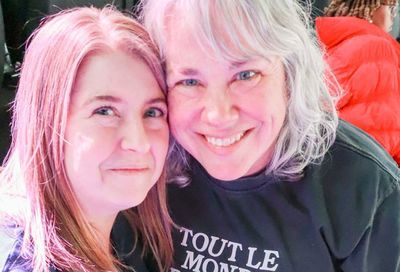Fresh Fruit
'Peter Paddington's' chatty nipples frame a wacky and moving depiction of an adolescent gay boy's coming of age
I think I’m in love with Peter Paddington. And not just because he reminds me of the overweight, under-popular, 13-year-old me.
Pitiful, loveable and innocently irreverent, Peter is a dead-on depiction of an adolescent gay boy, obsessed with other boys’ opinions, his own ”dink,” and body hair. He loves ice cream, cheese doodles, and chocolate bars, as well as the naively erotic ”Bedtime Movies” that help him fall asleep. Mostly, though, Peter worries about his deformed, cherry-red, and increasingly chatty nipples.
Yes, his chatty, cherry nipples. Peter Paddington is a hoot.
Brian Francis’s first novel centers on Peter’s dreamy ”Quest to be Normal,” and his innocent attempts to reach his goal. Armed with ”mental telepathy” which allows him to warn his enemies of the retribution to come, Peter vows to lose weight, to become popular, and to find a ”boy friend” of his own. His first step? Taping Scotch tape over his nipples, despite the inconvenience and pain. ”It looks like I have many-pointed nipples now. They’re stars, which are better than cherries any day.”
It would be easy to label this ”chick-lit for gays,” and many readers will speed through the book, laughing and tearing up, in the space of a day. And The Secret Fruit of Peter Paddington does fit that bill: a quirky, self-obsessed, and self-defeating narrator, with just enough charm and wit (and a cracked, happily crazy view of the world) to make us love him nonetheless. But there is something more meaningful going on here. Underneath the laugh-out-loud wackiness there is the sad story of a lonely and confused little boy.
In addition to Peter’s weight, his disappointing family, and the (unacknowledged) fear of his dawning sexuality, Peter is ineffectively braving a whole new world. Describing his place in the school’s social geography, Peter lists the thin, dumb Athletes; the overcompensating boys of the Short Group; the Geeks; the Goody Goody Group (girls with good grades who trade scented stickers); the Sluts; and the Banger Group and their bullying ways. Of the social outcasts — poor, stuttering Jackie and her dandruff-ridden counterpart Arlene — he says that, ”Even though I’m overweight and have deformed nipples, I never stutter. And there’s no way I’d be caught dead wearing a kitten sweatshirt.”
Peter’s only friend seems to be Daniela Bertoli — a foul-mouthed, equally lonely, equally defiant Italian neighbor. Daniela works two jobs and goes to Catholic school. She is poor and unattractive. But she has a dream — to win the Miss Basilico contest run by the local Italian-American community center — and Peter is drawn into her brief, beauty queen orbit. This reluctant, cantankerous friendship has a believable, begrudging truth to it. Daniela and Peter don’t want to be friends, and certainly don’t want to be identified as such. Yet, in some of the novel’s gentlest, most touching moments, it seems that they are.
Advertisement
|
Peter’s family, however, amps up the crazy. His mom is weepy, difficult, religious, and unable to make left turns while driving, and his sisters (one fat, one thin) are visions of selfish self-determination. The most obvious (and by that I mean trite) stereotype is Peter’s uncle — an unmarried, immature man who appears semi-regularly, wearing a succession of Hawaiian print shirts as he drops off his dirty laundry for Peter’s mother to wash. Thankfully, in a welcome twist on the genre, it seems like Peter’s weary father might be the first to see (and accept?) Peter for who he truly is.
At times, the quirkiness begins to feel a bit forced and episodic — an accrual of essays (a la David Sedaris) titled ”Peter Paddington and the Virgin Mary,” ”Peter Paddington and the Hunky Neighbor,” ”Peter Paddington and the Jungle Juice.” Add to this the increasingly precious device of Peter’s talking nipples, and at some points, the novel begins to feel just a bit too ”cute.”
But then you get to the end.
It’s a rare treat to find a novel that ends even more satisfyingly than it begins, but The Secret Fruit of Peter Paddington does exactly that. I don’t want to give too much away, but the book’s final moment depicts Peter’s (presumably last) ”Bedtime Movie.” It is hopeful, playful and creative, like all of Peter’s dreams. And it is appropriately devastating.
Support Metro Weekly’s Journalism
These are challenging times for news organizations. And yet it’s crucial we stay active and provide vital resources and information to both our local readers and the world. So won’t you please take a moment and consider supporting Metro Weekly with a membership? For as little as $5 a month, you can help ensure Metro Weekly magazine and MetroWeekly.com remain free, viable resources as we provide the best, most diverse, culturally-resonant LGBTQ coverage in both the D.C. region and around the world. Memberships come with exclusive perks and discounts, your own personal digital delivery of each week’s magazine (and an archive), access to our Member's Lounge when it launches this fall, and exclusive members-only items like Metro Weekly Membership Mugs and Tote Bags! Check out all our membership levels here and please join us today!






















